Parsnip is a veggie that looks like a carrot, but it’s quite longer than the latter, and it has a white color. This is a root veggie that belongs in the same group as parsley and carrots. It also has a lot of nutrients beneficial for humans.
But is it edible for guinea pigs, just like other root vegetables?
Can guinea pigs eat parsnips? Guinea pigs can eat parsnips, but ensure to feed them only in moderation to avoid health risks. It is packed with various nutrients, vitamins, minerals, fibers, and antioxidants beneficial for them.
This article will discuss a unique vegetable called the parsnip concerning guinea pigs’ diet. Keep reading to learn all the benefits, risks, and nutrients of this veggie for your guinea pigs. Let’s start!
Table of Content
Are Parsnips Good for Guinea Pigs? | Health Benefits
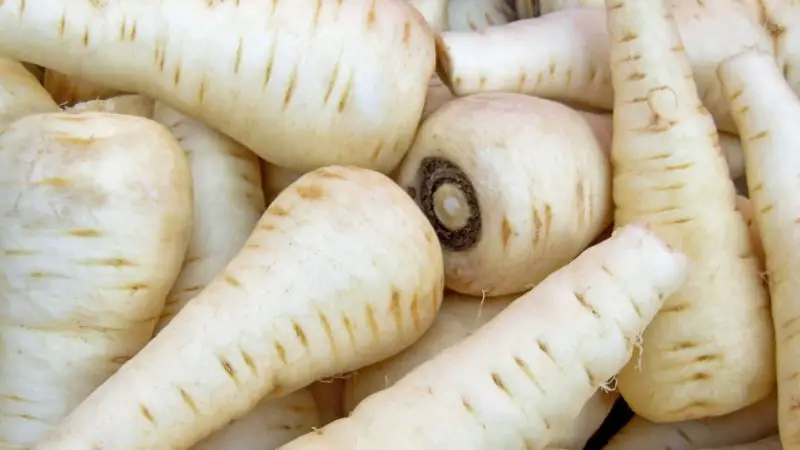
Parsnip is a safe food for the guinea pig, even though the aroma might not be the best one your guinea pig has ever tried. It is a root vegetable with various nutrients essential to your guinea pigs’ health.
Here are some of the health benefits of parsnips:
Scurvy Prevention
One great thing about parsnips is that they have lots of vitamin C. Without this vitamin, guinea pigs are prone to a disease called scurvy. This illness is fatal for them and causes internal bleeding, rough fur, lack of appetite, and loose stool.
Since guinea pigs don’t produce this vitamin naturally, they need to get it from supplements or food. So, the vitamin C in parsnips will keep your guinea pig healthy and safe from scurvy.
Healthy Cardiovascular System
Parsnips contain copper, iron, vitamin K, potassium, and a low amount of fat, beneficial to the cardiovascular system. With the help of vitamin K, the body makes a protein called prothrombin, which is essential for blood clotting.
Potassium keeps the cardiovascular system healthy since it contributes to a good balance of water and electrolytes in the body. This also means that the blood pressure will be maintained at healthy levels.
Moreover, copper forms the red blood cells and helps the body absorb iron. This means that with enough copper in an organism, the body will be less prone to anemia or similar blood-related problems.
Antioxidants
Many studies have shown links between a diet rich in antioxidants and a reduced risk of diseases. Parsnips are great sources of antioxidants for guinea pigs.
Parsnip is a part of the same family as carrots and parsley. This means parsnip is also packed with vitamins which play an important role in maintaining free radicals that damage cells and help to ensure that all body parts function properly.
Healthy Weight
Parsnips have a calorie content of 75. This is not too much, and it will not affect the weight of your guinea pigs, which means parsnip is not fattening for them.
Energy
Parsnip has a good amount of carbs and protein. The carbs will give the guinea pigs instant energy, while the proteins will provide a slow release of energy during the day.
Healthy Muscles
With magnesium, muscles will be strong and healthy. It removes aches all over the body and keeps the heart muscle in great shape too. Also, it reduces anxiety and the risk of diabetes.
Nutrition Facts of Parsnip for Guinea Pigs
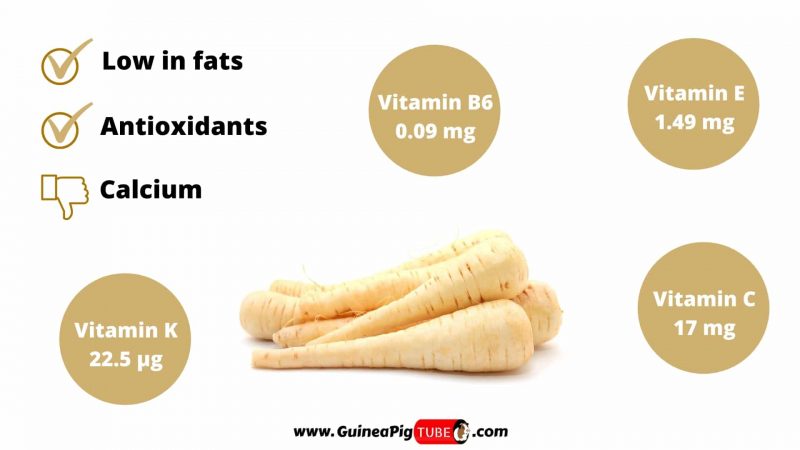
Here are the nutritional information for 100 g (3 oz) of parsnips:
- Energy – 75 kcal
- Protein – 1.2 g
- Total Lipid (Fat) – 0.3 g
- Carbs – 18 g
- Dietary Fiber – 4.9 g
- Sugars – 4.8 g
- Calcium – 36 mg
- Iron – 0.59 mg
- Magnesium – 29 mg
- Phosphorus – 71 mg
- Potassium – 375 mg
- Sodium – 10 mg
- Zinc – 0.59 mg
- Copper – 0.12 mg
- Manganese – 0.56 mg
- Selenium – 1.8 µg
- Vitamin C – 17 mg
- Vitamin B6 – 0.09 mg
- Vitamin E – 1.49 mg
- Vitamin K – 22.5 µg
- Thiamin – 0.09 mg
- Riboflavin – 0.05 mg
- Niacin – 0.7 mg
- Folates – 67 µg
Risks to Consider When Feeding Parsnips to Guinea Pigs
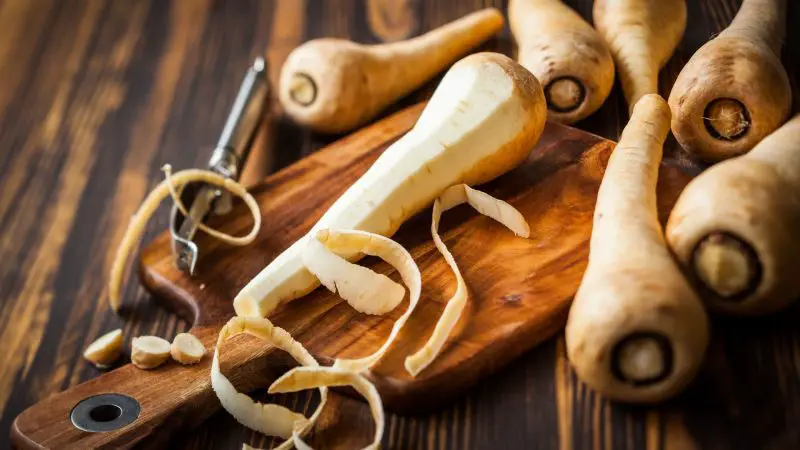
Here are some risks to consider when you overfed your pet with parsnips:
Urinary Problems
Calcium is a mineral that is important for the formation of strong bones and bone tissues. But, this is good only for young guinea pigs, not adult ones.
Otherwise, it piles up in their urinary tract and creates bladder or kidney stones, blood in the urine, painful urination, and even frequent urinary infections.
Digestion Problems
There is sugar in parsnip as well. It is not an amount that’s too high, but it should be fed in moderation. Too much sugar consumption causes the guinea pigs to have painful digestion or lose stool.
The digestive system of guinea pigs does not react well to any sugar, especially in high amounts.
Serving Size and Frequency of Parsnips for Guinea Pigs
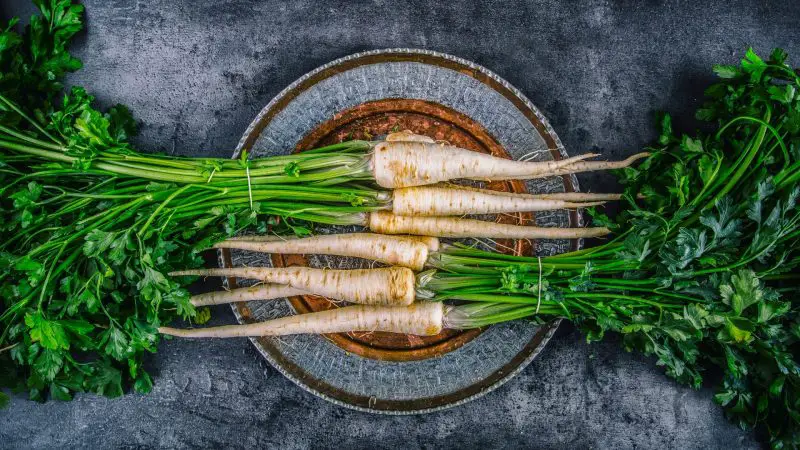
How Often Can Guinea Pigs Eat Parsnips?
Guinea pigs shouldn’t eat parsnips every day. Avoid providing them parsnips alone in their diet to avoid stomach problems.
However, providing them parsnip as an occasional treat won’t harm them. So, two times per week of parsnip is more than enough for our guinea pigs.
How Much Parsnips Can Guinea Pigs Eat?
Parsnips can be quite bad for guinea pigs, so they should only eat a small amount of these vegetables. Just give them a few slices of small to medium-size parsnip at once, and there won’t be any digestion problems for them.
The good idea is to mix the parsnip with another veggie, like a salad. If your guinea pigs dislike the taste, try to serve it mixed with lettuce, bell peppers, broccoli, asparagus, or kale. Be creative with their diet! The most important thing is that this veggie is a safe food for the guinea pigs!
More Information About Guinea Pig and Parsnip
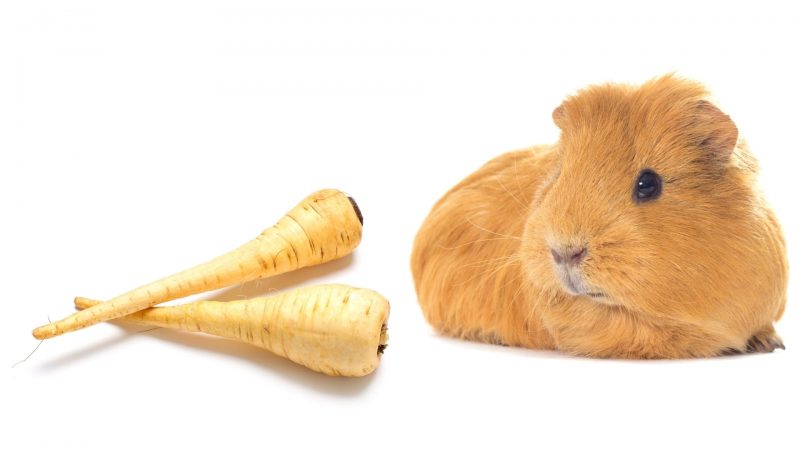
Do Guinea Pigs Like Parsnips?
Many owners have claimed that their guinea pigs dislike parsnips because of the aroma and taste. On the other hand, some owners claimed their guinea pigs like to nibble on the parsnips a lot. It is up to you to know if your guinea pigs will like parsnips.
Can Guinea Pigs Eat Parsnip Tops / Parsnip Leaves / Parsnip Greens?
There is much information on the internet that parsnip leaves are toxic to humans and pets.
On the other hand, some people say they eat parsnip greens without any problems. Well, we can say that guinea pigs can eat parsnip leaves, but it is not recommended.
Parsnip leaves consumed in large quantities can be toxic to guinea pigs and make them sick or cause allergies. It’s probably best if you don’t let your pet eat parsnip tops.
Can Guinea Pigs Eat Parsnip Skin / Parsnips Peel?
Guinea pigs can eat parsnip skin or parsnip peel. Before giving parsnip peels to guinea pigs, make sure to wash the parsnip peel thoroughly with water. This will help take off some of the dirt and chemicals on the parsnip skin.
Can Guinea Pigs Eat Raw Parsnips?
When feeding your guinea pig with parsnips, make sure you only give it small amounts of raw parsnips and never cook any vegetable because this will alter the nutrients and vitamin content. Guinea pigs can’t digest cooked parsnips. Cooked food can upset their stomach and cause symptoms such as diarrhea or vomiting.
Remember that you should always check with your vet before introducing new foods to your pet’s diet!
Quick Facts on Parsnips
- The parsnips originated from Asia and Europe and were introduced to America in the 17th century.
- In Scotland, the parsnip is known as ‘white carrot.’
- Before sugar was introduced in Europe, parsnips used to be a sweetener for cakes and jams. Also, parsnip was used for bread making in the 16th century.
- The ancient Romans thought parsnip was an aphrodisiac.
- Parsnip is related to carrot, dill, celery, parsley, and cumin.
Here is a video with some information and facts about parsnip:
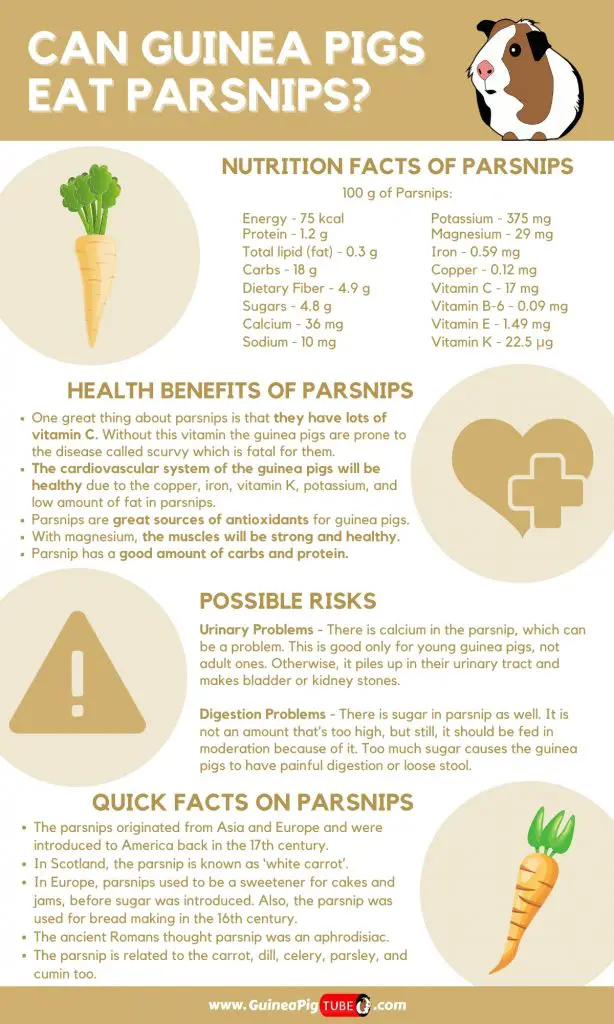
We have also made a full list of foods that guinea pigs can and can’t eat (150+ Types of Foods). Be sure to also check our recommended products page for everything you will ever need to assure a happy life for your guinea pigs. Hope this information was helpful and you have found the answer you were looking for.
List of Sources
The Nutrition Source: Antioxidants
Fooddata Central: Parsnips, Raw
